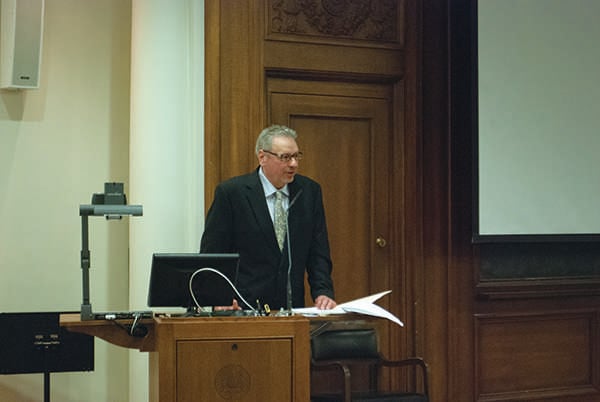The gap between an individual’s low economic background and middle class aspirations “doesn’t have to be debilitating,” journalist Alfred Lubrano (Medill ’80) said Thursday night.
Lubrano delivered the keynote address to about 50 people in Harris Hall as a part of Money Matters, a week organized by Northwestern’s chapter of Quest Scholars to promote discussion about socioeconomic diversity. Lubrano works as a reporter for the Philadelphia Inquirer and authored the book “Limbo: Blue-Collar Roots, White-Collar Dreams.” The book details the challenges of balancing a blue-collar upbringing with white-collar aspirations.
Emily Rivest, the co-social chair of NU’s chapter of Quest Scholars, said she had wanted to bring Lubrano to speak since the group began planning Money Matters.
“A friend of mine loaned me (Lubrano’s) book, and I read it in one night during the middle of all my midterms because I was so engrossed in it,” the SESP senior said. “What he wrote about is something that I thought would resonate with a lot of Northwestern students.”
Lubrano grew up in Brooklyn in a low-income family and said the transition to Columbia University, where he completed his undergraduate degree, was very challenging.
“Middle-class students are doing something their parents did, something which their parents and family have prepared them for,” he said. “College is not such a leap. Kids are moving from one middle-class space, home, to another, campus. They are not making the journey that working class kids are making.”
Lubrano also talked about the need for working-class students to change who they are in order to fit in, saying this can create tension with middle-class students.
“People from the working class attending a college like this must change themselves or at least important parts of themselves to fit in,” he said. “The problem arises because at the same time they feel like impostors. People can also become resentful that they feel like they have to change.”
Stephen Autar said he attended Lubrano’s speech because of his experience as a low-income student at NU.
“I’m someone who identifies as low-income, and the whole idea of a blue-collar background with white-collar aspirations is something I very much identify with,” the Medill junior said. “It was really comforting to hear it from someone who has been in the situation I see myself in now. The knowledge that he was in a situation like myself and he is somewhere now where he has a stable career, stable life is the biggest takeaway I had from the event.”
Lubrano encouraged students who are dealing with these issues to try and find a balance between both identities.
“I think if you’re a person like me and you consider yourself fortunate, if you could be upward mobility but still rooted in an empowered role, some kind of reconciliation will come to you if you finally meld the two people you really are,” he said.
Email: [email protected]
Twitter: @tylerpager













